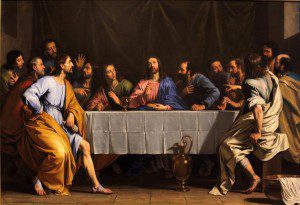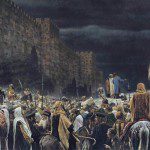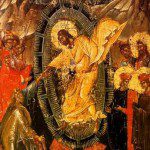
Different from all other nights
Why is this night different from all other nights? This question is asked on Passover as a prompt to remember the story of an enslaved people, spared and chosen and changed. Jesus didn’t abolish that commemoration, but transformed its meaning on the night he was betrayed.
He carried out the ritual of Passover and completed it: after supper he took the bread and the wine and shared them with the shocking words we now hear so routinely and calmly: “This is my body. This is my blood.” This is the new covenant. The old had been well and duly fulfilled.
This night was different from all other nights because it would divide the imperial world, and continue to divide the world, even as, in a larger, truer, more cosmic way, it united the divided world in one wide embrace of mercy. Luke’s account of the supper includes an argument among the rowdy disciples even at that sacred moment over who was to be greatest in the kingdom. How typical, then and now.
Jesus answered their dispute by washing their feet. This was another shock: for their beloved rabbi to take off his outer garment, lay aside his authority, and perform a service consigned to slaves upended their sense of propriety. It was, in its way, a sacrilege. Peter, we read, was horrified.
John’s account of the last supper, puts this night, different from all other nights, in a cosmic context, and casts Jesus not just as the beloved teacher, but as the being of light transfigured on the mountain, full of divine knowledge.
Notice the verb tenses in John’s account. It doesn’t move from beginning to middle to end. Instead, time references weave like a Celtic knot, reminding us in sentence after sentence that he was and is and is to come.
Jesus “knew that his hour had come.” That knowing infuses the story with dramatic irony: we, who come after, may recognize how all these events, so baffling at the time, fit like pieces in a mosaic whose beauty and order can be apprehended only from a distance—really only from a distance greater than twenty centuries.
Jesus knew what he was about. It was always, as he told his mother, his Father’s business. He knew that what would happen must happen. He was not simply a victim of political violence; he submitted with complete awareness of what his captors were bringing about, who knew not what they did.
“Already” is a key word in this story and in ours. God has already prepared a place for us. Forgiveness has already been given. The Spirit is already at work wherever we show up. Our deepest questions have already been answered and our deepest needs met in ways it may take us a lifetime to fathom. This is the mystery of predestination—not a simplistic notion of scripted action that forecloses freedom, but a reminder that the God who entered into history is also the One who lives outside time whose mind is the source and ground of all being.
In the story we see a series of simple verbs: Jesus rose, laid aside his garments, took a towel, tied it around his waist, poured water, washed feet, and dried them. Each act has its separate significance as a feature of divine encounter.
And this night is the moment of divine encounter. God meets us here, again. Like Peter, we may not be ready for that meeting. Jesus’ words to Peter are full of compassion for his very human limits: “What I am doing you do not understand now, but afterward you will understand.”
He lived, and we live, in time. But now and then the veil lifts, perhaps in the deep quiet of prayer or meditation, perhaps at the moment of holding out our hands to receive the sacrament, perhaps in some awakening to what Wendell Berry called “the larger, looser, darker order of merely human love.” At those moments we may be surprised by joy, finding ourselves at “the intersection of the timeless with time,” plunged into the Now that is God’s dwelling place.
This night is different from all other nights because the Spirit of God who moved over the waters and illumined the transfigured Christ and blew like a mighty wind through the upper room is present to us still in the utter uniqueness of the this moment, ready, when we are ready, to meet us and lift us into a place, which, though it is not yet, is already among us.
[image courtesy of snappygoat.com]















